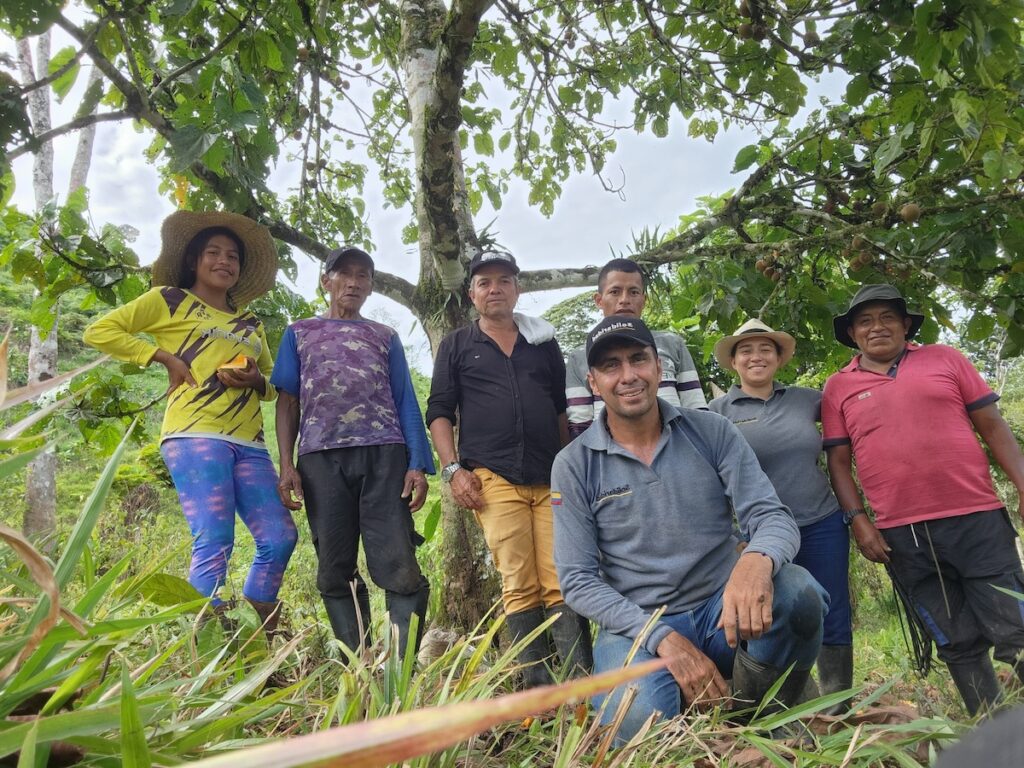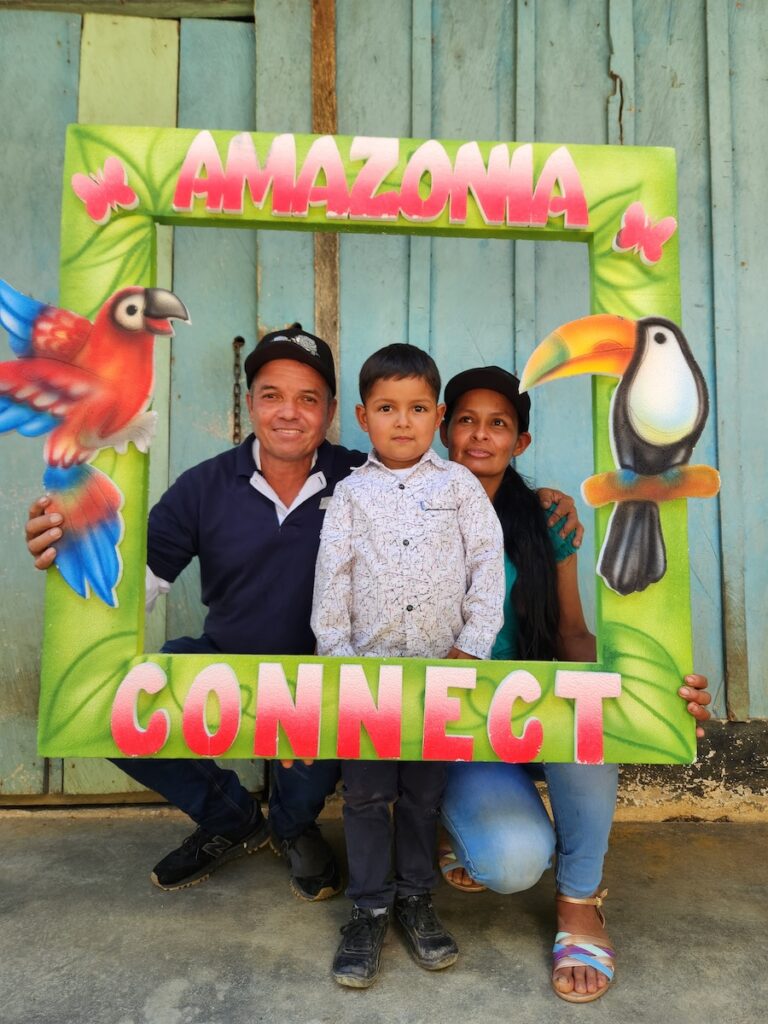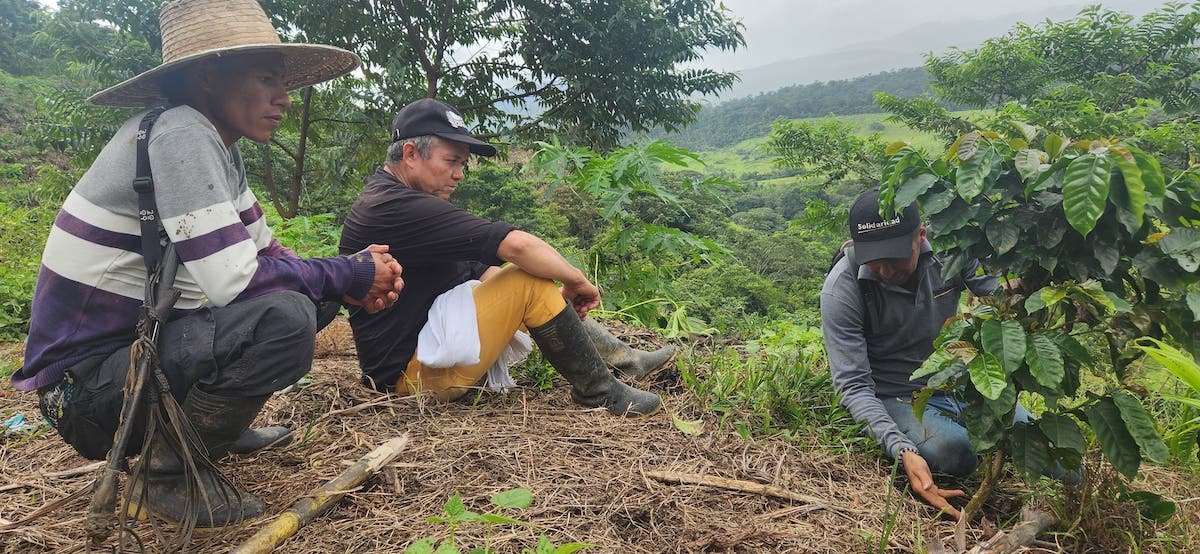Despite being born in the heart of prime coffee territory in Colombia, Arquimedes Ramírez first connected with his coffee roots once he moved into the San Vicente del Caguán mountains, an area in the department of Caqueta approximately 17 years ago.
Caqueta is known as the gateway into the Colombian Amazon, but it’s not necessarily known for its coffee growing. When Arquímedes arrived in the area, his family took up cattle ranching. They bought forest land and converted it to pasture. As soon as he could, Arquímedes bought his own piece of land to become a livestock farmer like his father.
“We were settlers. Opening forest land in the mountains by ax and machete was the typical thing. It was easy to buy 50 or 60 hectares of land, clear the forest and introduce livestock”
Now at age 53, his views on deforestation are changing as he shifts his focus to coffee production. He has started to work with technical staff from Solidaridad as one of 900 farmers in the Caqueta who are participating in Amazonia Connect. This is a five-year partnership between USAID, Solidaridad, the Earth Innovation Institute, the National Wildlife Federation and the University of Wisconsin-Madison. The initiative aims to promote and scale the adoption of low-emission commodity production to improve biodiversity conservation and climate resilience in Brazil, Colombia and Peru.
Coffee farmers participating in the programme in Caqueta are receiving technical and financial assistance to increase their coffee quality and boost sale prices, all while improving the overall sustainability of their farms.

DEEP ROOTS IN RURAL LIFE
Initially drawn to cattle ranching, Arquímedes eventually moved to Florencia, the capital of Caqueta, and worked in a variety of businesses, including a bakery, construction and a general store. Though the results of his ventures weren’t bad, he soon realized that city life couldn’t provide the happiness he was seeking. As the old saying goes, ‘You can take the boy out of the country, but you can’t take the country out of the boy.’
Arquímedes bought new land near the city of Guacamayas in the San Vicente del Caguán mountains. At the same time he learned he was going to be a father, which served as an inspiration to settle down and find a way to work with the land. “The land I had acquired in the mountains was not suitable for livestock, so I decided to sow coffee. There were some coffee plots then, but not many and they were very haphazard”, he shares.
Soon, caring for his coffee plots became a passion, and Arquímedes became an example to neighboring farmers. Others started to see coffee as a suitable crop for the mountainous land. Arquímedes’ leadership skills made him a natural advocate for coffee producers and his community. Currently, he is the president of Guacamayas Coffee Growers Association.
“Within the San Vicente municipality, I’m the contact person for coffee growing here, people call me for any kind of information.”
As a community leader, Arquímedes had his first contact with Amazonia Connect in the city of Florencia. This was at the kick off of the project’s effort to support coffee growers as they optimized their coffee producing processes.
“We have been working hand in hand with Solidaridad for a year and half. There has been a change in the way people think. People have taken up nursery practices, like seedbeds and shade houses for germination. It has been a complete change.”
These new agricultural techniques have helped farmers improve productivity. For example, the use of nurseries helps improve seed selection and the cultivation of coffee seedlings prior to planting in the fields, which makes for a more efficient use of land and ensures healthier coffee plant production.

FROM THE MOUNTAINS TO HIGH QUALITY COFFEE MARKETS WITH AMAZONIA CONNECT
In addition to promoting low-carbon production practices, Amazonia Connect helps farmers commercialize their coffee. Siruma Coffee, a quality-focused coffee exporter, is the private sector partner in the project. A visit to Siruma’s coffee lab was an inspiration for Arquímedes who had become Guacamaya’s coffee advocate.
“It was a marvelous experience; starting with the fact I had never been on a plane before, it was my first time. We had a lot of training on marketing from technical staff.”
Following the training, the Guacamayas Coffee Growers Association reached an agreement with the Siruma in an effort to completely transform their process for marketing their coffee.
Previously, the coffee beans were brought down the mountain by mule, and then transported to the town of Neiva by “ladder bus”, a vehicle adapted to sinuous unpaved roads of the mountains. Most of their production was then sold through middlemen in Huila, a more well-known coffee origin.
In Huila the price paid didn’t quite cover the logistical effort of delivering the coffee. Thanks to backing from Siruma coffee, the participating coffee farmers have shifted their focus to establishing Caqueta as a specialty coffee origin. Farmers are now focused on producing specialty coffee and meeting environmental sustainability criteria. The farmers now believe that they have a better chance of capturing greater value for their coffee production, and Arquímedes has become the community’s representative on this new effort.

“Coffee from Caqueta is an Amazon coffee, a coffee that can reach triple A quality. The only thing is that we didn’t know how,” says Arquímedes. “With the training we received people have gotten used to working with improved coffee varieties.”
Thanks to their work with Amazonia Connect these small-scale farmers are already looking forward to an increase in prices as they harvest their first specialty coffee beans. This focus on quality—rather than high volumes—is sure to provide environmental benefits and can lead to a better price. The new cultivation practices place a real value on an Amazonian landscape, capturing carbon, cleaning the air and helping to mitigate the effects of climate change.
Amazonia Connect was a 5-year partnership between USAID, Solidaridad, Earth Innovation Institute, the National Wildlife Federation, and the University of Wisconsin-Madison that aims to promote low-emission commodity production and biodiversity conservation in Brazil, Colombia, and Peru. The initiative was canceled in 2025 in its third year of implementation when USAID was phased out.

